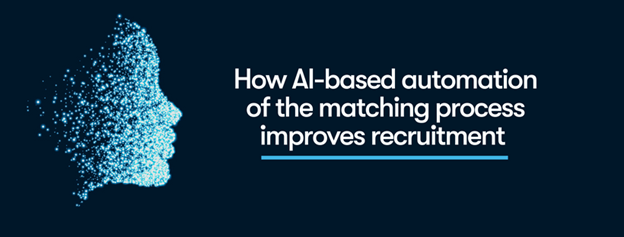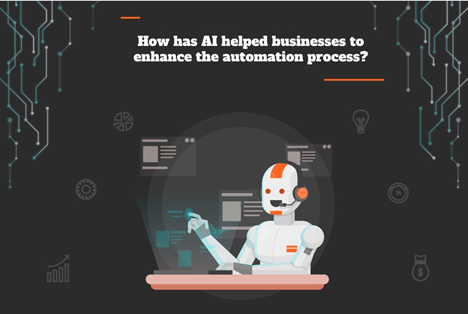As modern businesses are transitioning to become leaner and more efficient in their operations, they are becoming more inclined towards productivity, accuracy, and affordability. In the past, industries used high-tech machinery to increase workers’ efficiency and reduce the workload. But as organizations enter the next phase of the industrial revolution, “Industry 4.0,” they utilize advanced technology such as automation to simplify the business process.
However, the true value of automation does not reside with a single technology; in fact, when automation is fused with intelligent technology like artificial intelligence (AI), it can be more effective. Most industries are acquainted with the benefits of automation, but remain elusive about the role of AI in optimizing automation efficiency and vice versa.
 The concept of AI is relatively new, and many consider it the same as automation. Here are some points that determine how AI and automation are different and in what ways they can complement each other.
The concept of AI is relatively new, and many consider it the same as automation. Here are some points that determine how AI and automation are different and in what ways they can complement each other.
How is AI-Based Automation Different from Legacy Automation?
Pure automation works with a common goal of automating repetitive tasks, but it cannot be applicable where decisions need to be made autonomously. This is where AI-based automation could be convenient, imitating human cognitive skills. AI’s ability to self-learn and become a decision-maker just like humans make it more rewarding for business automation.
In short, regular automation performs tasks based on pre-defined rules, but when integrated with AI, the business processes make decisions independently.
How Has AI Helped Businesses Enhance the Automation Process?
From the first transaction on ATMs, to voice-based search on Google, automation has changed how humans interact with machines. It is still progressing and exploring new avenues with AI-based automation.
AI-based automation or Intelligent Process Automation (IPA) can be orchestrated into four elements, which all bring a different strength to the automation process and make it more intelligent:
- Machine Learning (ML)
- Natural Language Processing (NLP)
- Intelligent Workflows
- Robotic Process Automation (RPA)
Automation with AI capabilities is proactive in solving issues without human intervention. Take the example of the manufacturing industry. Currently, there are many processes that are optimized with automation, such as logistics, compliance, production, supply chain, workplace safety, and more. One survey indicates that the manufacturing sector can see a 55% boost in productivity by 2030 due to automation. However, automating the business process is one thing, and scaling them up is another. Artificial intelligence, when combined with automation, can help the manufacturing industry scale up its processes and overcome core challenges.
One area where AI has tremendously helped the manufacturing industry is identifying the breakdown of machinery in a timely manner and minimizing maintenance costs. AI-based predictive analytics gathers data from various devices or sensors connected with the machinery and picks up the unusual behavior in the production line to predict the useful life of the assets. It collects historical and real-time data from various equipment such as vibration and temperature and determines when equipment could fail or need repair. The maintenance manager can use this data to replace the parts to avoid unexpected breakdowns and minimize downtime issues.
 AI uses a combination of other technologies to execute the automation process with higher accuracy. One such technology that is proving a game-changer in automation is computer vision. AI-based computer vision enables computers to visualize and analyze objects just as human eyes. Unlike the human eye, it can analyze thousands of business processes or products in just a few seconds. It uses a camera, data, and algorithm to examine objects from a human perspective and act accordingly. It makes the automation process fast and reliable. It can be used for quality inspection, predictive maintenance, workplace safety, etc. Just like in manufacturing, AI can augment the automation process for various other industries such as retail, healthcare, finance, automobile, IT, and more.
AI uses a combination of other technologies to execute the automation process with higher accuracy. One such technology that is proving a game-changer in automation is computer vision. AI-based computer vision enables computers to visualize and analyze objects just as human eyes. Unlike the human eye, it can analyze thousands of business processes or products in just a few seconds. It uses a camera, data, and algorithm to examine objects from a human perspective and act accordingly. It makes the automation process fast and reliable. It can be used for quality inspection, predictive maintenance, workplace safety, etc. Just like in manufacturing, AI can augment the automation process for various other industries such as retail, healthcare, finance, automobile, IT, and more.
AI-based automation via AI software is becoming popular among the digital workforce and enables them to excel as a whole and not merely focus on task completions. It allows organizations to identify the touchpoints that enhance their bottom line and customer service. It can even alert the potential threat in the process and mitigate the risks before it gets worse.
There are endless ways AI-based automation is improving the business process, and moving forward, businesses should consider automating their processes as much as possible. It boils down to the concept of “hyper-automation” that accelerates business process efficiency by using RPA, low code application platforms, and AI. Gartner predicts that by 2024, organizations will lower operational costs to 30% by integrating hyper-automation at various levels of the business process.
Conclusion
For decades, businesses have been using various technologies in bits and pieces to reduce manual work and speed up their efficiency. Now, technologies have become more connected and autonomous to replace humans with machines that perform repetitive tasks. In those terms, automation and AI are some of the best technological discoveries that have happened to humans.
There is no question that automation and AI are incredible technologies in their own terms, but when combined, it can truly add value to businesses. It sets the precedent for future work that demands machines to act and think like humans. Moreover, it helps businesses become more organized and free up employees for more strategic and mission-critical jobs.




